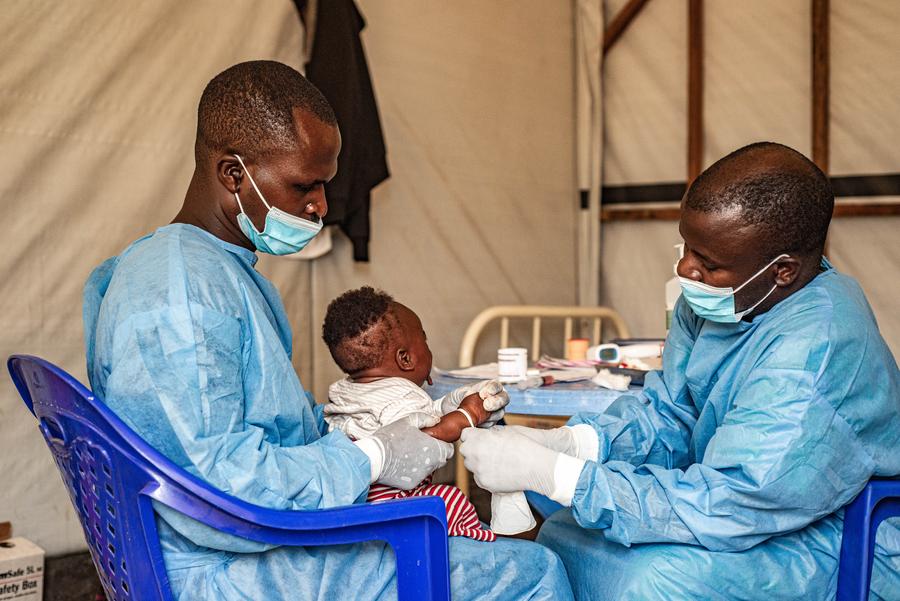A child who caught mpox gets treatment at a hospital in the Nyiragongo territory near Goma, North Kivu province, eastern Democratic Republic of the Congo (DRC), on Aug. 15, 2024. /Xinhua

Read 3 minutes
The Africa Centers for Disease Control and Prevention (Africa CDC) has warned of the high burden of mpox cases, limited diagnostic capabilities, and the disease’s high fatality rate as some of the pressing challenges hindering the continent’s mpox response efforts as the number of cases surges across Africa.
Africa CDC Director-General Jean Kaseya, in an update on the multi-country mpox outbreak in Africa issued Friday, said the challenges are also related to the rapid spread of the disease to new countries and disparate attempts to address mpox amid the greater need to improve coordinated efforts.
Data from the Africa CDC show that from the beginning of 2024 to Friday, August 23, a total of 21,466 potential cases of mpox, and 591 deaths have been reported from 13 African Union (AU) members.
The 13 AU members that have reported mpox cases so far include Burundi, Cameroon, the Central Africa Republic, the Republic of the Congo, Cote d’Ivoire, the Democratic Republic of the Congo (DRC), Gabon, Liberia, Kenya, Nigeria, Rwanda, South Africa, and Uganda.
“The cases and deaths seen are just the tip of the iceberg, given that mpox is mostly a mild condition and due to limited surveillance, testing, contact tracing, and reporting,” Kaseya said in an update letter to African health ministers concerning the ongoing mpox outbreak in Africa.
He also warned of the high case fatality rate of mpox, which he said is mostly between 3 and 4 percent, adding that the disease’s link to HIV is also of particular concern for Africa.
According to Kaseya, several previously unaffected African countries have recently reported their first imported cases of mpox, and there is a high risk that the virus could spread beyond Africa.
“Even as I wrote this letter, Gabon has confirmed its first case, while Sierra Leone and Malawi are now testing their suspected cases,” Kaseya said, who insisted that a negative test result in the laboratory does not mean there is no mpox epidemic.
On August 13, the Africa CDC declared the ongoing mpox outbreak in Africa as a Public Health Emergency of Continental Security (PHECS), citing “the clear and present danger that the onslaught of mpox is posing to the continent.”
A day after the Africa CDC declared PHECS, the World Health Organization (WHO) also declared mpox a public health emergency of international concern, activating its highest level of global alert for mpox for the second time in two years, amid an increasing number of cases of a deadlier new variant reported across and outside Africa.
Kaseya said the AU’s specialized healthcare agency, in declaring the PHECS, has consulted “African best epidemiologists and lab experts” as well as international experts and appropriate bodies, including the China CDC, U.S. CDC, European CDC, and the WHO.
“The conclusion is that relying solely on laboratory test results for diagnosing mpox is not advisable. We need a holistic approach that integrates laboratory testing with clinical assessment and epidemiological data that is essential for accurately diagnosing and managing mpox. The diagnosis and management of mpox should involve a comprehensive approach,” he said.
Earlier this week, the Africa CDC disclosed that mpox vaccination could start “in the coming days” as the number of cases surges across the continent.
The Africa CDC chief said by working closely with African countries, the WHO, and various partners, as well as by leveraging the AU’s political, policy, and advocacy capacities in responding to the outbreak, the agency is supporting African countries in their preparedness and response activities.
He also disclosed that the Africa CDC is deploying around 200 epidemiologists and logisticians in all mpox-affected African countries. This is against the backdrop of the deployment of 24 experts to support the response in the DRC and other most affected countries.
Noting that a continental strategy for mpox was developed to mobilize resources and coordinate the outbreak response, Kaseya said an incident management team was established under the leadership of the Africa CDC.
Post Views: 14
This article was originally published by a africa.cgtn.com . Read the Original article here. .


